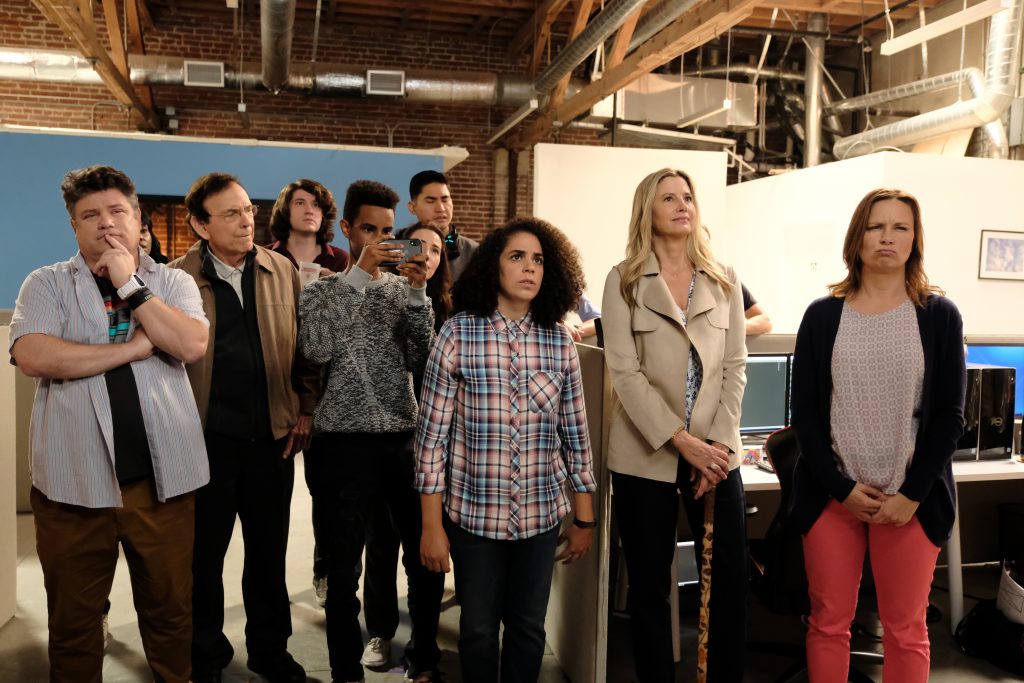August 15, 2021
by Carla Hay

Directed by Anthony Guidubaldi and Keith Strausbaugh
Culture Representation: Taking place in Las Vegas in 2019, the mockumentary comedy “Marathon” features a predominantly white cast of characters (with a few African Americans) representing the working-class and middle-class.
Culture Clash: On the 15th anniversary of a small-time marathon in Las Vegas, various quirky marathon participants endure slapstick-style obstacles and challenges during their training and during the marathon itself.
Culture Audience: “Marathon” will appeal primarily to people who like Christopher Guest-inspired mockumentaries that skewer people who obsess over “winning” or “being No. 1.”

“Marathon” is a mockumentary in the best sense of the word. It’s a wacky yet slyly comedic parody of a fictional obscure running marathon, the people who obsessively train for this race, and the marathon’s smarmy founder who has all the sincerity of a snake oil salesman. This movie is an example of how a mockumentary can be entertaining with the right screenplay, direction and cast. There’s plenty of absurdity but also plenty of truths about society and certain lengths that people will go to to boost their egos.
Written and directed by Anthony Guidubaldi and Keith Strausbaugh, “Marathon” benefits from having cast members who are talented in improvisational comedy. The scenes don’t seem over-rehearsed, because in order for a mockumentary to succeed, it has to look like the actors have some level of spontaneity, even if they’re reading lines from a script. What also makes “Marathon” better than the average mockumentary is that it easily could’ve relied on stereotypical caricatures, but each character in the movie has just enough quirkiness to make their personalities unique.
This is a mockumentary where the “documentary director” doesn’t try to be the star of the movie too. Viewers won’t even find out the director’s name for this low-budget “documentary” that’s chronicling these marathon-related antics, starting from three months before the marathon. Except for two or three scenes, the “documentary film crew” is not seen on screen. And when anyone from the “film crew” is on screen, it’s very brief. It’s a wise choice because putting too much of the “behind the scenes” crew on screen would be distracting to the overall story.
“Marathon,” which takes place in 2019 in Las Vegas, focuses on “five amateur runners as they trained for a life-changing event,” according the movie’s intro. It might not actually be a life-changing event, but what they’re training for is the Devil’s Canyon Marathon. You know right from the start that this 26.2-mile marathon is a disaster waiting to happen because it takes place in a desert. And it’s questionable if the marathon really has a legal permit to take place.
The founder/director of the marathon is actually a shoe salesman for his day job. His name is Ed Clap (played by Jimmy Slonina), who is a combination of nerdy and shady. Most of his interview footage takes place in his cluttered office. He spends the majority of his interview over-hyping the marathon and giving a questionable version of the marathon’s history.
The running gag with Ed is that he likes to boast about what an amazing event the Devil’s Canyon Marathon is (it’s celebrating its 15th anniversary), but he lets certain details slip that prove the marathon is really a sloppy sham. He mentions that every time he goes to city hall to renew the permit, the office workers shut down the office when they see him coming. Ed wonders aloud in a clueless way if he’s been banned from city hall.
Ed also brags about the Devil’s Canyon Marathon merchandise, which he repeatedly says that he designed himself. He’s particularly proud of the T-shirt that reads, “I Ran With the Devil.” Ed comments on the shirt, “We got into some trouble with some groups who thought it promoted satanism. But you know what? I think we invite all people to run.”
He pauses slightly and adds, “We do have a few satanists run in the marathon. They’re very nice people.” And that’s when Ed notices that he ordered all the shirts in just one size: XXL. It won’t be the only dimwitted mistake that he makes for this marathon.
The five aspiring marathon runners spotlighted in the movie all are in their late 20s to mid-30s. They are:
- Ryan O’Brien (played by Andrew Hansen), an arrogant realtor who thinks he’s the alpha male of everything, but the only thing he seems to be good at is making a fool out of himself.
- Jenna Kowalski (played by Natalie Sullivan), a neurotic radiologist whose goal is to break the Guinness world record for the fastest marathon time while dressed as a fruit, so she dresses like a banana during her training and during the marathon.
- Shareef Washington (played by Tavius Cortez), an African American accountant who keeps getting racially profiled by white cops when he’s running outside.
- Abby Dozier (played by Anais Thomassian), a former eighth grade teacher who took a year off from marathon training to have her son Miles (her first child), and she wants to prove that she can get back into marathon running after giving birth.
- Emilou Paunch (played by Kimia Behpoornia), a law firm’s administrative assistant who gives up early on participating in the marathon when she finds out it’s 26.2 miles, so she decides the only “marathon” she’ll do is binge-watching TV while eating junk food and smoking marijuana.
Not surprisingly, a few of the marathoners get injured. And aside from physical injuries, egos get bruised. One of the situations that causes hurt feelings is when a new marathon contestant suddenly comes on the scene. Jenna is very unhappy at first about it because she thinks this new contestant is an interloper who’s there to steal her thunder and possibly try to break the same Guinness world record.
As a documentary producer (played by Darren Pitura) explains to Jenna, the documentarians found her story so compelling, they decided to bring someone else into the documentary who will also compete in the marathon in a banana costume. He’s a flaky actor named Ben Duffy (played by Roberto Raad), who’s just there for the paycheck. However, Ben and Jenna unexpectedly become attracted to each other when they’re forced to spend time together and say scripted conversations for the documentary.
There’s another motive for the documentary filmmakers to bring a second person dressed as a banana in the marathon, besides to cause drama. The agricultural corporation Dole has signed on to sponsor the film. Therefore, as Ben says, he’s not just an actor, he’s “product placement.” (And in case anyone is wondering, Dole really did pay for product placement in “Marathon,” which makes it a meta joke for the film.)
In addition to showing how these marathoners train, the documentary reveals aspects of the marathoners’ personal lives. Ryan is a divorcé who’s still bitter about the end of his two-year marriage (he says that his ex-wife cheated on him), and he admits that he hasn’t really dated anyone in the past two years because he wants to focus on himself. Later, he becomes enraged when he finds out that the film crew interviewed his ex-wife, who is shown in shadows and with her voice disguised, as if she’s afraid of her identity being exposed.
Ryan is so full of himself that he says that he’s always a “winner” in life. A constant joke in the movie is how Ryan is on such an ego trip that he starts to boss around the camera operator/cinematographer, who’s not seen on camera and only identified as Jeff (played by Jeff Topper). At one point, Ryan acts as if he’s in an athletic competition with Jeff. He mocks and insults Jeff when the camera operator can’t seem to keep up with Ryan’s running pace.
It’s also revealed in the movie that Ryan is obsessed with entering the Boston Marathon. The most recent time he tried out for the Boston Marathon, he didn’t make the qualifying cut by nine seconds. Ryan comments, “Boston is like the Colosseum [in Rome]. And we’re like the gladiators, out here in these small provinces, hoping to make it to Rome.”
Jenna is very sensitive about being a bachelorette. Maybe that’s because she has a friend like Grace DeWitt (played by Kasey Wilson), who’s interviewed for the film. In her interview, Grace comments that the average marathoner is a 35-year-old man who’s middle-class or upper-class, so Grace thinks being in a marathon is the perfect way for Jenna to meet a potential husband. The movie then cuts to Jenna saying that she’s doing the marathon for herself, not to get a man.
Shareef, who’s a bachelor, has a sibling rivalry with his sister Sequoia Washington (played by Tiffany Luce), who is a more accomplished athlete and doesn’t let Shareef forget it. Shareef comments, “She’s a tri-athlete. I just ‘try’—her words.” Sequoia is shown in the movie to be someone who insults Shareef more than supports him. She thinks he won’t go far in the Devil’s Canyon Marathon. Sequoia describes Shareef as being like a whiny “little baby” and adds: “He can’t finish a marathon. He can’t even tie his own shoes.”
Shareef says of his childhood: “I started running in middle school. It was the only way I could get away from my family, school, life—just my way of coping with myself.” As for being frequently pulled over by white cops when he’s out running, Shareef says with a hint of sarcasm: “Apparently, there are a lot of guys committing crimes in gym shorts with no pockets.” Shareef gets racially profiled by white cops several times throughout the movie, but “Marathon” handles it in a way that’s not offensive to the Black Lives Matter movement because the movie is a satire that makes racist cops look bad.
Abby is sometimes interviewed with her clingy husband Michael Dozier (played by Marc Roberts), who is so nervous about saying the right things that he often ends up saying the wrong things. For example, he tries too hard to come across as enlightened and “politically correct” when it comes to race relations. But then, he gets tongue-tied and stammers when he lets it slip that everyone in his social circle is white.
Emilou, who is literally sitting out this marathon (by watching TV on her couch), dryly says in one of her interviews: “Here’s the secret to running a marathon: Quit early.” She also explains why she wanted to be in the marathon before she changed her mind: “I’m in a rut. Not really a rut, but a ditch—a small ditch.”
Later in the movie, when bachelorette Emilou is in the parking lot of a supermarket, she has a somewhat awkward and surprise reunion with someone she knew in high school: a guy she privately calls “Big Dick Brian” (played by Jeremy Boone). They hug each other after apparently not seeing each other for years, and they exchange phone numbers. The movie shows how Emilou handles if or when Brian will call her.
Several mishaps and misunderstandings ensue in the lead-up to the marathon, which doesn’t start until about 60 minutes into this 82-minute movie. Viewers will get plenty of laughs at how seriously the characters take this marathon when it’s not supposed to be taken seriously at all. Not all of the jokes and gags land well, but there’s more than enough hilarity—thanks to the very amusing performances—to bring this marathon mockumentary over the finish line to be a comedic triumph.
Gravitas Ventures released “Marathon” on digital and VOD on July 6, 2021.


